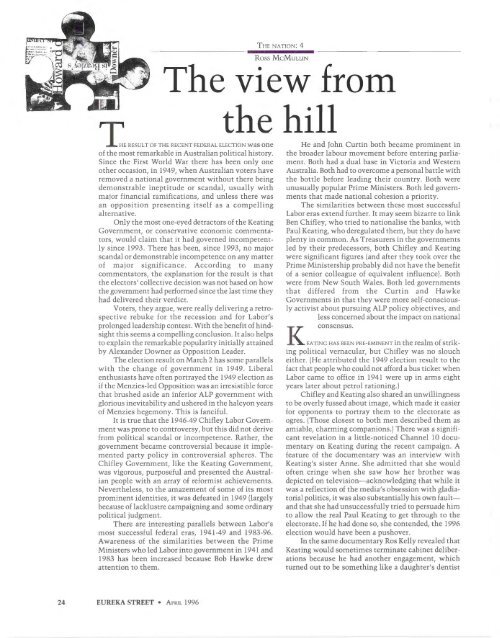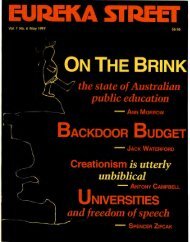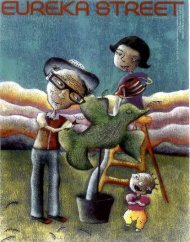Shane Malone - Eureka Street
Shane Malone - Eureka Street
Shane Malone - Eureka Street
You also want an ePaper? Increase the reach of your titles
YUMPU automatically turns print PDFs into web optimized ePapers that Google loves.
THE NATION: 4<br />
Ross M cMuLLI<br />
The view from<br />
TcHSuCTom•"'c'NmmRm!!:~ hH~a!!n Cunin both became ptomincnt in<br />
of the most remarkable in Australian political history. the broader labour movement before entering parlia-<br />
Since the First World War there has been only one ment. Both had a dual base in Victoria and Western<br />
other occasion, in 1949, when Australian voters have Australia. Both had to overcome a personal battle with<br />
removed a national government without there being the bottle before leading their country. Both were<br />
demonstrable ineptitude or scandal, usually with unusually popular Prime Ministers. Both led governmajor<br />
financial ramifications, and unless there was ments that made national cohesion a priority.<br />
an opposition presenting itself as a compelling The similarities between these most successful<br />
alternative.<br />
Labor eras extend further. It may seem bizarre to link<br />
Only the most one-eyed detractors of the Keating Ben Chifley, who tried to nationalise the banks, with<br />
Government, or conservative economic commenta- Paul Keating, who deregulated them, but they do have<br />
tors, would claim that it had governed incompetent- plenty in common. As Treasurers in the governments<br />
ly since 1993. There has been, since 1993, no major led by their predecessors, both Chiflcy and Keating<br />
scandal or demonstrable incompetence on any matter were significant figures (and after they took over the<br />
of major significance. According to many Prime Ministership probably did not have the benefit<br />
commentators, the explanation for the result is that of a senior colleague of equivalent influence). Both<br />
the electors' collective decision was not based on how were from New South Wales. Both led governments<br />
the government had performed since the last time they that differed from the Curtin and Haw kc<br />
had delivered their verdict.<br />
Governments in that they were more self-conscious-<br />
Voters, they argue, were really delivering a retro- ly activist about pursuing ALP policy objectives, and<br />
spective rebuke for the recession and for Labor's<br />
K<br />
less concerned about the impact on national<br />
prolonged leadership contest. With the benefit of hind-<br />
consensus.<br />
sight this seems a compelling conclusion. It also helps<br />
to explain the remarkable popularity initially attained<br />
EAT! c HAS BEEN I'RE-EMINE T in the realm of strikby<br />
Alexander Downer as Opposition Leader.<br />
ing political vernacular, but Chiflcy was no slouch<br />
The election result on March 2 has some parallels either. (He attributed the 1949 election result to the<br />
with the change of government in 1949. Liberal fact that people who could not afford a bus ticket when<br />
enthusiasts have often portrayed the 1949 election as Labor came to office in 1941 were up in arms eight<br />
if the Menzies-led Opposition was an irresistible force years later about petrol rationing.)<br />
that brushed aside an inferior ALP government with Chifley and Keating also shared an unwillingness<br />
glorious inevitability and ushered in the halcyon years to be overly fussed about image, which made it easier<br />
of Menzies hegemony. This is fanciful.<br />
for opponents to portray them to the electorate as<br />
It is true that the 1946-49 Chiflcy Labor Govern- ogres. (Those closest to both men described them as<br />
ment was prone to controversy, but this did not derive amiable, charming companions.) There was a signififrom<br />
political scandal or incompetence. Rather, the cant revelation in a little-noticed C hannel 10 docugovernment<br />
became controversial because it imple- mentary on Keating during the recent campaign. A<br />
mented party policy in controversial spheres. The feature of the documentary was an interview with<br />
Chifley Government, like the Keating Government, Keating's sister Anne. She admitted that she would<br />
was vigorous, purposeful and presented the Austral- often cringe when she saw h ow her brother was<br />
ian people with an array of reformist achievements. depicted on television-acknowledging that while it<br />
Nevertheless, to the amazement of some of its most was a reflection of the media's obsession with gladiapromincn<br />
t identi tics, it was defeated in 1949 (largely to rial politics, it was also substantially his own faultbecause<br />
of lacklustre campaigning and some ordinary and that she had unsuccessfully tried to persuade him<br />
political judgment.<br />
to allow the real Paul Keating to get through to the<br />
There are interesting parallels between Labor's electorate. If he had done so, she contended, the 1996<br />
most successful federal eras, 1941 -49 and 1983-96. election would have been a pushover.<br />
Awareness of the similarities between the Prime In the same documentary Ros Kelly revealed that<br />
Ministers who led Labor into government in 1941 and Keating would sometimes terminate cabinet delibcr-<br />
1983 has been increased because Bob Hawke drew ations because he had another engagement, which<br />
attention to them.<br />
turned out to be something like a daughter's dentist<br />
24 EUREKA STREET • APRIL 1996
















